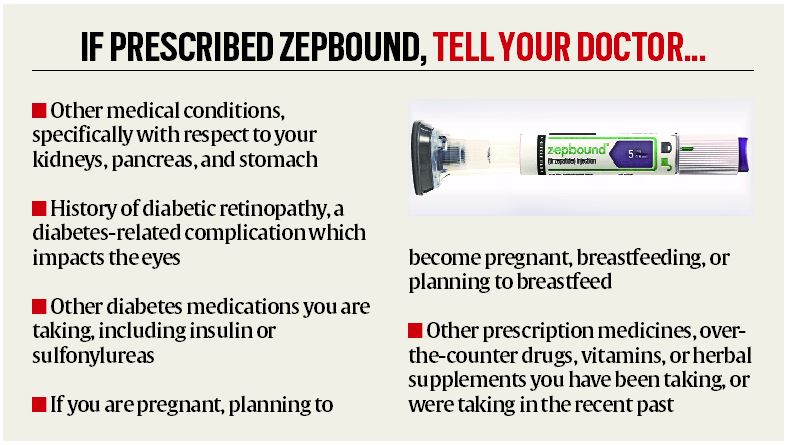Context
-
Indians can now avail the blockbuster weight loss and diabetes drug Tirzepatide — marketed as Mounjaro and Zepbound in the US and made by Eli Lilly — with the apex drug regulator’s subject expert committee giving a go-ahead for its import and marketing.
-
The final approval is expected to come from the Drug-Controller General of India based on this recommendation.
-
About Mounjaro and Zepbound
- Mounjaro addresses diabetes more while Zepbound targets weight loss. Both will be available in a pre-filled pen and have to be injected subcutaneously (under the skin).

- The committee has approved the import of single dose vials and pre-filled pens of the injectable drug in six different doses, ranging from 2.5 mg to 12.5 mg. This nod is based on two global clinical trials, which also included a significant number of Indians.
- In a trial of adults without type 2 diabetes, those on the highest dose of Tirzepatide lost an average of 18 per cent of their body weight in 72 weeks. And, in a trial among those with diabetes, participants lost an average of 12 per cent of their body weight.
- Semaglutide belongs to a class of drugs called GLP-1 receptor agonists, which lower serum glucose levels.
- Tirzepatide mimics both the GLP-1 hormone and the GIP hormone.
- The latter can trigger insulin creation and sensations of fullness, thereby increasing the chances of weight loss.
- It should not be given to people with a history of pancreatic diseases, disorders of the endocrine systems, nausea and vomiting.
- The patients should also be asked to follow a diet and exercise first.
- The drug should be prescribed only when they are able to maintain the same weight level or bring it down by adhering to it.
- The FDA has approved Wegovy (semaglutide) and Zepbound (tirzepatide) for chronic weight management in adults.
- These drugs can be prescribed to those who are obese (with a body mass index of over 30), or overweight (with a BMI between 27 and 30), and have at least one other health condition related to their weight (such as high blood pressure, high cholesterol, or type 2 diabetes).
- Both are administered as under-the-skin injections, and are intended to be used alongside a reduced-calorie diet and increased physical activity.
- Semaglutide and tirzepatide are polypeptides, small proteins that boost the levels of naturally-occurring hormones in the body, including that of glucagon-like-peptide 1 (GLP-1), which control weight through the brain and digestive tract.
- Higher GLP-1 levels, released in the gut, spark a reaction by stimulating neurons that alter gut function, leading to a sense of fullness. This process also taps into a brain mechanism that lights up neural pathways, triggering the sensation of satiety — the feeling of being satisfied and having had enough to eat.
- They also help manage glucose levels, making them an effective treatment for diabetes.
- Semaglutide only targets GLP-1 receptors. On the other hand, tirzepatide also boosts a second hormone: glucose-dependent insulinotropic polypeptide (GIP). The GIP also regulates weight through receptors in brain and fat cells. Eli Lilly claims that the combined action of GLP-1 and GIP enhance each other’s effects.
- Zepbound is a prescription medicine. It cannot — and should not — be used for cosmetic weight loss.
Weight back if drug is stopped
- Obesity drugs are also not one-time miracle solutions for weight loss — data from trials indicate that these drugs need to continue to be taken for their weight loss and other effects to last.
Source: IE
Visit Abhiyan PEDIA (One of the Most Followed / Recommended) for UPSC Revisions: Click Here
IAS Abhiyan is now on Telegram: Click on the Below link to Join our Channels to stay Updated
IAS Abhiyan Official: Click Here to Join
For UPSC Mains Value Edition (Facts, Quotes, Best Practices, Case Studies): Click Here to Join
